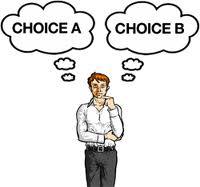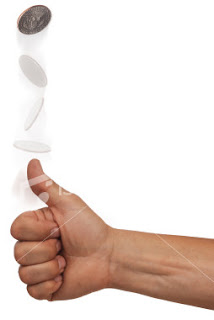RS4:
Would You Let a Coin Toss Decide Your Future?
This
Freakonomics podcast discussed the economic benefits of having a coin toss
determine your future. It began by
telling the story of Daniel Harrington, an ex-professional racecar driver, who
was indecisive about his career, quit and then got a job in the field of
energy. After working in that field he
said he became unsure about his job again.
He said that he wished he could leave his big decisions up to a coin
toss or rock, paper, scissors. This got
the guys at Freakonomics thinking, what if we left our major life decisions up
to a coin toss?
 In
a previous podcast, the guys at Freakonomics explained the benefits of
quitting, and how strategic quitting can be a great thing. They told the story of one woman who quit her
stable job at an IT firm to become an escort, and another woman who left her Amish
religion. Both women were totally
content with quitting, and were satisfied more after they decided to quit. Steve Levitt, one of the guys at Freakonomics,
said that he even promotes quitting. He
tells his children that if they are not good at something to quit because it
prevents them from wasting their time.
Serra Mentessi, a female runner, told the story of how she was not sure
if she wanted to quit running. After
years of running she lost her passion for it, but felt that she had to stick
with it because she felt running defined who she was. One day she began running when all of a
sudden the “Upside of Quitting” podcast came on and she knew that would be her
last run. Here, Steve Levitt was
explaining that decision-making is related to economics.
In
a previous podcast, the guys at Freakonomics explained the benefits of
quitting, and how strategic quitting can be a great thing. They told the story of one woman who quit her
stable job at an IT firm to become an escort, and another woman who left her Amish
religion. Both women were totally
content with quitting, and were satisfied more after they decided to quit. Steve Levitt, one of the guys at Freakonomics,
said that he even promotes quitting. He
tells his children that if they are not good at something to quit because it
prevents them from wasting their time.
Serra Mentessi, a female runner, told the story of how she was not sure
if she wanted to quit running. After
years of running she lost her passion for it, but felt that she had to stick
with it because she felt running defined who she was. One day she began running when all of a
sudden the “Upside of Quitting” podcast came on and she knew that would be her
last run. Here, Steve Levitt was
explaining that decision-making is related to economics.
In
economics you have sunk costs and opportunity costs. A sunk cost is cost that has already been
incurred and cannot be recovered.
Opportunity costs are costs of an alternative decision that must be
given up when one course of action is pursued.
Although some decisions involve money, not all decisions have to involve
money in order for them to be a sunk cost or an opportunity cost. If I had the decision whether to stay in my
relationship or break up with my boyfriend, that would involve sunk costs and
opportunity costs. My sunk costs would
be all the time that I spend contemplating the decision. My opportunity cost would be all the things I
gave up if I decided to break up with him.
All decisions involve sunk costs and opportunity costs, which is why
Freakonomics thinks that it would be best to have this coin toss.
The
coin toss experiment would first begin with an in depth survey which would weigh
out the pros and cons of both decisions.
The purpose behind this is to hopefully get you to make the decision for
yourself. If you are still indecisive at
this point then you have the opportunity to participate in the coin toss, where
you can choose the number of times the coin is tossed. Freakonomics makes you sign a waiver saying
that you promise to make the decision the coin toss determines for you, and
then they send you a survey a few months later to see if you are content with
the decision. The whole point of this
process is to eliminate the frustration and time consumption that it takes to
make a decision. By providing people
with this service, they are giving those who use it a release so they do not
have to continually fret over the decision-making process.
Freakonomics
provided listeners with an interesting podcast, whether or not we should leave
our big decisions in the hands of a coin toss.
While at first I was against this, I definitely changed my mind about
it. I think, economically speaking, the
coin toss would be the better decision because it gives you more time to do
other things that matter. For example,
instead of freaking out about whether I should take one job over the other, I
can let the coin toss decide for me while I worry about other important
things. Although it seems baffling to let
a coin toss determine serious decisions, I think that economically it is the
best choice.



No comments:
Post a Comment